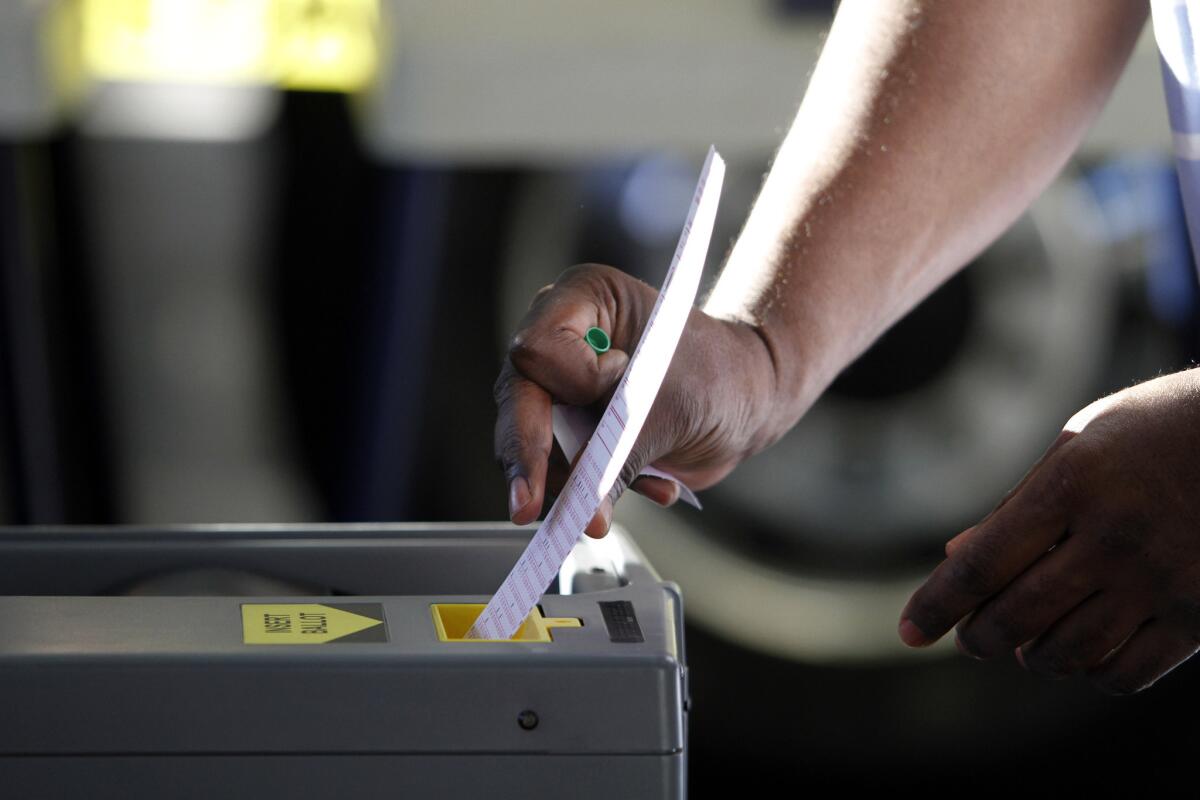Repeal of utility users tax heads to vote

A Glendale resident casts his ballot at Fire Station 21 in during the 2014 primary election. A ballot measure that aims to repeal a local utility tax will go before voters June 2016. The tax provides $28 million in revenue for the city but is being challenged by a group of residents.
- Share via
A ballot measure aimed at repealing the local utility users tax will go before Glendale voters next June during the presidential primaries.
The $28-million source of annual revenue for the city is being challenged by a group of residents who circulated a petition and received enough signatures to force a vote.
City Council members could have pushed the ballot item for an election date as far as April of 2017, but they settled on June 7, 2016, with a 4-1 vote. Councilwoman Paula Devine cast the sole dissenting vote, saying she’d like to have more time to conduct outreach.
A June date is fine, said Councilman Vartan Gharpetian, as long it’s enough time to educate the public on how vital the tax is to local parks and their upkeep. He said a repeal is illogical.
“Yes, it’s a tax, but how much is it? Are you willing to pay that tax to have those resources for our children mostly?” Gharpetian said.
The utility users tax was established in 1969 and is a 7% tax on electricity, gas and water bills.
Removing $28 million from the budget could force personnel cuts in the local police and fire departments, according to city staff.
City Manager Scott Ochoa said the utility tax is 15% of the city’s revenue stream and it makes up for taxes Glendale doesn’t have that other nearby cities do, such as a business license tax.
Such a big of a blow to a revenue source would undo the apparatus of public safety services, Ochoa said, and contracting out services to the Los Angeles County Sheriff’s Department might have to be on the table.
“It’s all going to be crippled,” Ochoa said. “How you want to be crippled is a decision [the council] has to make if it were passed. The petitioners that brought this forward really don’t care.”
Bill Taliaferro, one of the three residents behind the petition, said it’s not his responsibility to prioritize cuts, but the need for revenue came from things such as too many benefits within City Hall.
“It was kind of revealing that they assumed [voters] would vote against it. Why would they assume that?” Taliaferro said.
Council members may legally write arguments against the proposed repeal. The city may also disseminate information about budget implications, but it can’t outright take a position on the matter.
“I have faith in the voters of Glendale that once they hear about the devastating impacts this utility users tax elimination will cause, I have faith that they will do the right thing, I want to get that before as many voters as possible,” said Mayor Ara Najarian.
Councilwoman Laura Friedman said she prefers looping the item in with the presidential primary because it would generate a strong turnout, something her colleagues expressed wanting as well.
The city will have to shell out $230,000 to place the item on the primary ballot versus $40,000 to have it appear in the next local municipal election on April 4, 2017. Organizing a special election would cost an estimated $300,000.
But it may be a better idea to just get it out of the way as soon as possible, without having the sword of Damocles hanging over the heads of Glendale residents, City Clerk Ardy Kassakhian said.
In April 2017, the first district-based elections will be held as the Glendale Unified School District and Glendale Community College’s board of trustees shift from an at-large system of voting. With districts in play, some voters may be dissuaded from heading to the polls if they don’t have matters that concern them on the ballot, Kassakhian said.
“Districts would be the most significant change in Glendale elections in the last 100 years,” he said. “The question is, do you want to muddy those waters by throwing in a [utility users tax] initiative?”
If the utility users tax is repealed, the city would have to wait at least a year before it could try to reinstate it in a future election, said Senior Assistant City Atty. Lucy Varpetian.
The effort to recall the tax is the latest in potential cuts to the budget sought by outside groups. The city remains embroiled in a legal battle over the legitimacy of the annual $20-million transfer from Glendale Water & Power revenues.
--
Arin Mikailian, arin.mikailian@latimes.com
Twitter: @ArinMikailian
